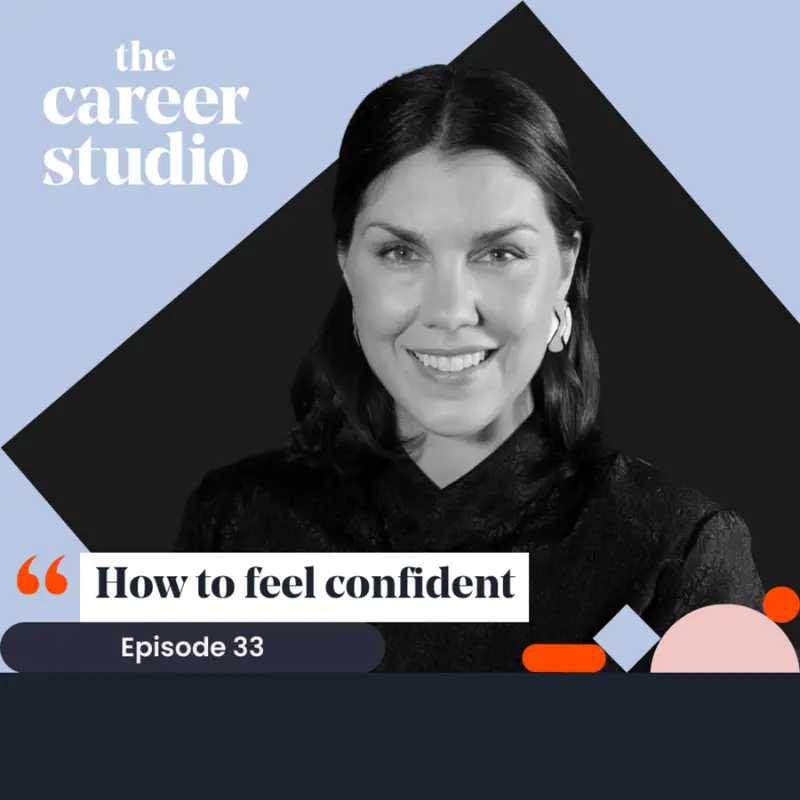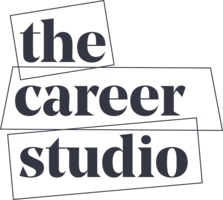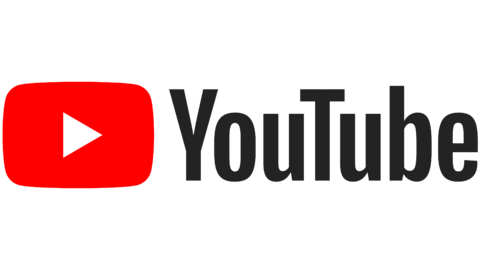How to feel confident

Confidence is something everyone wants more of. And the good news is - it’s a muscle you can strengthen. As with everything, it’s just about knowing what to focus on. Confidence comes from three places: the stories we tell ourselves about the struggles in our life, our belief in ourselves to navigate the unknown, and our willingness to feel any feeling. Ultimately this is about accepting your own imperfections and learning to be with uncomfortable emotions.
PLUS an exciting announcement - I’m launching a group program and releasing extra content this month to support it.
I dive into all the details in the episode.
Are you ready to create an energizing career you love?
You can create a career that is simply an extension of who you are and how you want to live your life. If this sounds like what you’re after then schedule a consultation. We'll get to the bottom of what's going on for you. And exactly where you need to focus to bring your career and life into alignment. It's free!
For more from The Career Studio
Transcript
Welcome to the career studio podcast, where we boil down the noise and focus on the core concepts, essential for building an energizing career you love. One that is simply an extension of who you are and how you wanna live your life. Anyone can do it. It's just a matter of knowing what to focus on.
Hello, feels like a long time since I recorded a podcast. So it's good to be back and Yeah, I wanted to start the episode today by making a little announcement, and I'm announcing it here on the podcast first, because I consider the listeners here to be my most engaged fans. I think you guys are really into the content. You're listening to an episode every month.You're leaving reviews. And I love you for that. Thank you. Keep telling other people about the value you're getting from this. I really appreciate that.
So I wanted to let you know that I'm going to be launching a group program. I'm super, super excited about this. The formal announcement will be going out to my email list and online on March 6th. So you want to make sure that you get my emails if you don't, so that you can get all of the details on exactly who it's for and what's included. But I'll say briefly here. This is really about me bringing my work to more people, helping more people who feel lost and stuck in their careers.And in thinking about how do I touch more people with this work? How do I make this work even more accessible?
You know, cause right now I can't take any more clients on, my program is full. My one on one program. I have a wait list of people wanting to work with me. Yeah, this work is really important and I love it and I want to give it to more people and kind of the other thing I was thinking about alongside that is just how much, how much is possible when you get the right support, you're in the right container, you have the right conversations, everything is 10x'd.
Your learning, your insights, your connections when you get the right support. And I really think that taking what has been so effective over the past few years with my work in a one on one Model and bringing it to a group is just going to compound what's possible for the people in the group.
I think learning these concepts within that container is just going to make everyone learn faster and achieve more because there's other people to learn from. And the way I've structured it is that, you know, you can, you have the opportunity for kind of individual feedback as well as learning in the group context.
And you can get all that when the announcement comes out. So I'm super, super excited for this. If this sounds like something that's interesting to you, or if you know anyone in your life that would get value from this work, please have them sign up to my email list. You can just go to www.thecareer.studio and there's a newsletter pop up when you, at some point on the site, it'll pop up. And there's also, I think at the bottom of the footer of the site, there's a newsletter signup form. So,have people sign up. There's big, big stuff in the pipeline for me and the business. I'm, I'm really excited about where it's going and the month of March, there's going to be a lot of extra content that I am creating now that will be released then to support this big announcement.
So there's gonna be a couple extra podcast episodes. So keep an eye out for those. There's going to be a workshop. So yeah, I'm super excited about everything that's in store and really excited to be able to share it with you guys. First, my most energized fans. So, all right, you know, you can always get in touch if you have questions or whatever, but keep an eye out is the main thing.
Okay. So today I wanted to talk about confidence and specifically how to feel confident. I think this is something everyone wants more of and it's something I certainly talk a lot about with my clients, but creating confidence can feel super elusive. You know, people want confidence when they're doing something they've never done before, right?
But it's very hard to access confidence because confidence in the classic sense comes from doing something you've already done, right? Like you can feel very confident in your ability to pour water or type an email because you've done it a billion times. And this is where confidence comes from. So in the absence of having done something many times already, how do you learn to build confidence?
And the good news is that confidence is really a muscle that you can build. And once you understand what I'm about to lay out today, even your existing confidence is going to grow and you're going to build your confidence in new ways. So let me break it down for you. Confidence really comes from three places and I will present each of them in order.
So first confidence comes from the stories you tell yourself about the low points in your life, how you feel about the negative experiences in your life. I think the tendency for all of us is to want to highlight our successes and hide our struggles. Right? And shine a light on what we're proud of and, and sweep what we're not under the carpet.
But this way of being will breed insecurity and self doubt. Okay? Because what you're doing here when you hide your mistakes, the things that have been hard for you, your failures, your shortcomings, when you hide them, it's essentially like you are making your imperfection wrong. And the thing is, your imperfection is inevitable.
We all have low points in our life. We've all had things we struggled with and are struggling with. So what's really important about these aspects is that we are not afraid of them. That we don't make them mean that we're not good enough or that no one will like us because of those things. So you really want to go back and look at what are the low points in your life and what is your story about them?
You know, you want to own that story and you want to be okay talking about it as part of your narrative, right? You want to frame the points, the low points in your life and, and the story that you tell yourself. You want to frame the low points in your life and you want to tell the story to yourself and to others with compassion and with forgiveness.
And, and you can have, you know, wisdom that you share and you can poke fun at yourself, but you want to accept that this happened to you and that's okay, and you don't want to be afraid to talk about it. If you really own your shortcomings and your hardships, this is how you start to increase your self confidence and self worth.
So just some examples for me, you know, when I moved to New York, I struggled for many years. I was really super unhappy professionally. And of course, I talk about that all the time in my work. And frankly, that's been very cathartic for me to just really talk about it and own it and, and talk about my mistakes and what I've learned from them.
You know, this is me taking ownership and shining a light on a low point in my life and kind of making that work for me. That's been super empowering. Personally, when I moved to New York, I also didn't have the friends I wanted. I didn't have the social life I wanted. I was in a series of very bad relationships.
And I talk about that now. I've restructured my social life and I have a great group of friends and I'm super settled and happy here in the city, but it wasn't always that way. And I talk about that when people ask me, where are you from or how long have you been in New York or how did you meet so and so, you know, I, I share that story and I own it.
And by talking about it and giving it air, I'm giving it less power over me. So yeah, that's, that's just an example. I can see who I was when I moved to New York seven years ago as a much different person that I am now. And that version of me had a lot to learn and, and a lot to unwind from. And I've done a lot of work on myself personally and professionally to get where I am.
But, you know, that's part of being human and that's part of my growth journey. And I'm super proud of the work that I've put in to become the person that I am now. And I, and I know that I'll look back on who I am now and in five or 10 years and, and also have so much wisdom and growth and learning to share.
So I'm just giving that as a tangible example, but yeah, you want to talk about the low points in your life with forgiveness, with compassion, with. Humor with acceptance. Really? And, this is super important to building confidence. Okay. So that's lever one that you can pull. Lever two way to build confidence comes in your belief in yourself to navigate the unknown.
Okay, this is often what people want confidence for like, Oh, I've, you know, never spoken in public before. I'm thinking about starting this business and I want to feel more confident. As I said before, you know, you've never done it before, so you're not going to feel confident in the way exactly that you want because you literally have never done it before.
So there's kind of two points to this. One, it's a mindset point, right? So you're, you're doing something you've never done before. If you focus on everything that could go wrong and what that would look like, and if you catastrophize and focus on all of the risks and all of the potential failures and how horrible that would be, I mean, you're totally going to stay in your comfort zone because you're on this like narrative.
As I often call it with my clients, this TV channel in your brain, like think of your brain like an old school television, you're the thoughts you're putting in your brain when you're in that space of what could go wrong. This is going to create so much fear and insecurity that you're definitely not going to pursue the thing that you haven't done before because you're only focused on what could go wrong.
So you need to focus your brain. You need to choose intentionally to focus on what you do know. In the situation and how you will figure out what you don't know, okay, in order to try new things. It doesn't mean that you have to ignore the fact that there might be some risks, right? This isn't about toxic positivity.
You just have to choose intentionally to focus on what you do know and how you're going to figure out what you don't and how you're going to mitigate your risk. And you can go and listen to my podcast on this called how to mitigate risk if you want. Some more details, but yeah, it's not always gonna feel natural and that's okay, but that's the work.
That's the growth practice is bringing your mind to a TV channel, to a narrative that serves you. Okay. So you're navigating something you've never done before. You're focusing on. What do I know? How am I going to figure out what I don't write? Yes, there's some things I don't know. That's okay. And that's normal.
So you, you get your headspace there and then there's still going to be residual discomfort. This is the discomfort that comes with doing anything new, right? If, if you wait to feel complete certainty and calm, you will never do something you've never done before, because this is part and parcel. of doing new things is this feeling of uncertainty and fear.
There's always fear with the unknown. Okay. But what you want to learn is how to be, with your fear. Right. And, you know, you've heard the expression, get comfortable being uncomfortable. This was one of my mentor's favorite expressions and I love it. Right. And this is what it's talking about.
Right. You know, it's okay that you feel uncomfortable. Okay. Courage isn't the absence of fear. Courage is saying, I feel the fear and I'm still going to keep going. Right. I'm going to focus on what I do know and I'm going to focus on how I'm going to figure out what I don't. So, and then if you practice taking action while feeling fear, then you develop confidence to do it again, because you're like, okay, I allowed myself to be afraid and feel uncertain.
And I still took the actions I wanted. I practiced really focusing on what I didn't know. I took small incremental steps, right? This is how you can build confidence to navigate the unknown. Right? Do you see that? It's not about feeling confident. It's just your confidence in your ability to feel fear and take action and know that you'll be okay.
It's like confidence in being in that emotional space is I think a lot of times what people are after. And the only way to do that is just practice, practice taking action while feeling a level of discomfort. And discomfort doesn't mean stop and, and turn around always. Oftentimes, if the thing is something that you're really excited about and it's in alignment with your goals and you're getting the right support, you will still feel uncomfortable and that's okay.
And learning the difference between bad discomfort and good discomfort is really important. But what's super important here is just learning how to be with your emotions, right? Learning how to be with fear and not making that…..wrong. Then the third lever that you can pull to build your confidence is your own willingness to feel any emotion.
Okay? So the reason we do or don't do anything is because of how we think it'll make us feel. Okay. I'm going to say that again. The reason we do or don't do anything is because how we think it'll make us feel. And if we are afraid of certain emotions, if we can't be with certain emotions, if there's certain emotions we are afraid of, then there are certain actions that we will not do.
Okay. This is kind of related to what I said before. If you're afraid of feeling discomfort, then you're not going to take every step outside of your comfort zone. Alright, so if you're afraid of feeling embarrassed or awkward or ashamed or if you're afraid of feeling disappointed because something you tried didn't work out, then you're going to avoid doing all the things that create those emotions, which, by the way, are all the things you need to do new things like it is absolutely guaranteed that you're going to feel uncomfortable, disappointed, embarrassed, ashamed, awkward in pursuit of big goals.
Like, as an entrepreneur, I feel those feelings, not every day, but certainly they're part of me growing my business, right? Putting myself out there, trying stuff and it not always working and having to learn from that. You can build your willingness to feel any emotion by getting comfortable feeling emotions.
You have to learn how to tune into your feelings and be with your feelings to understand that feelings are temporary and they will be uncomfortable for a moment or for a short period of time. But if you're really with them and you really turn up the dial on your emotional experience, it's like a big fire that will blaze really big.
And then as the fuel starts to be used up, it'll start to dissipate. And this is just how an emotion is. And you can go listen to my podcast on how to feel your feelings if you want more direction here. But the more practice you give yourself on really being with your motions, uncomfortable emotions, being with them and allowing yourself to move through them, the more you will develop the muscle of feeling any feeling because you'll recognize that, okay, the worst thing that can happen is an emotion. And like, yeah, sure, embarrassment isn't that comfortable, or shame is a pretty gnarly emotion, or disappointment doesn't feel good, but these are the price, the admission ticket to the things that we want and they are temporary.
And then we have the results for life. Okay. And then we've become the person who's created those results. So you want to see your uncomfortable emotions as the necessary experiences to step outside of your comfort zone and create whatever it is that you want. So the more willing you are to feel any feeling.
The more confident you will be because you'll be like, yeah, I'll try that. I'll do that because like, what's the worst that can happen to a feeling and I'm down for that. Okay. So those are, those are my three points.
Basically confidence comes from one, how you feel about the negative experiences in your life, the stories you tell yourself. Two, your belief in yourself to navigate the unknown. Okay. Learning how to be with the discomfort, focusing on what you can control. And then three, your willingness to feel any feeling, really being open to the full spectrum of possible emotions so that you aren't, you know, avoiding certain things because you're afraid of feeling.
Okay. And so what's really important to take away here is that confidence is absolutely a skill that you can build. All of this stuff is stuff you can practice. Okay. What it really requires is learning how to manage your mind and learning how to be with your emotions. Okay. And this is why one of the pillars of my work is the mindset work, because it's all about this.
Your mindset and your emotions, they go hand in hand, and this is what opens up so many of the actions you need to take to restructure your career in a way that's energizing. Okay. And then confidence is also about accepting your own humanity, right? Like you are imperfect, right? Your humanity in that you are an imperfect human being, and that is what being human. You are imperfect, just like the rest of us.Welcome. And that's totally okay, right? And really accepting this. I think the problem in our society is people like to put on the shiny front.
And so then it makes us think that, oh, they're not imperfect. Everything in their life is perfect, but that's a lie. All of us have light and shade. All of us have insecurity. All of us have had low points in our life. And you're the same as all of us. So the more that you accept your own imperfection, it's going to allow other people to feel comfortable being imperfect around you. Okay. And that makes people want to be around you. When someone is really comfortable with who they are as an imperfect human being, it's incredibly relaxing to be around.
And it means that you can also trust that person. And so this is just an important life lesson. You know, I think the other thing that all of this requires or, or is aided by is commitment, right? So when you go into the unknown, you do something you've never done before. If you're like, I'm committed to doing this.
I'm committed to staying the course. I'm committed to doing this despite what I know will happen, which is hurdles and mistakes and mess ups and failures and uncomfortable feelings, right? I'm here for all of it. And I'm committed to getting there, even though I don't know how, and even though I know it's going to have.
Like hard stuff and I'm going to have to grow and learn as a person, right? Like that's how I feel about this podcast. This podcast has nowhere near the traction that I'd like it to, but I'm learning a lot in the process. I'm having to grow as a person in order to figure out how to make this work in the way I want.
In order to create content, I really want to have more interviews on here. I have to figure out a way to do them that works for me and my audience. You know, there's so much I have to learn to make this podcast successful. And sure. It's sometimes disappointing to not have the traction I want, or, you know, like all of the struggles I've had in creating content in a sustainable way that doesn't annoy me, um, anyways.
You know, I'm here for it because I have this goal of making this, a successful podcast and I'm committed to that goal. And I know that I'm going to have to go through a lot in order to get there. And I'm committed to doing that. So I think if, you know, bringing in commitment into a lot of the unknown can kind of help plug the gap for where you would hope there would be confidence.
I don't have confidence on how to create a successful podcast because I've never done it before. Sure, I can get mentors around me and advice and support and I'm doing that, but I think I made my point. Stay committed and be willing to feel any feeling. Be willing to manage your mindset. Be willing to be imperfect.
And if you're to iterate and improve, and if you're committed and you keep going, you will eventually meet your goal. And I really think that's, that's like one of the key tenets of personal growth is just believing and staying committed. Right. Just not giving up and learning and iterating along the way.
So that is the podcast for today. You can build your own confidence muscle if you practice these things and yeah, wishing you a fabulous few weeks. I'll be back in a couple of weeks with more content. Okay guys, have a fabulous day.
Hey, if you're ready to create an energizing career you love, one that is simply an extension of who you are and how you want to live your life. Then I wanna invite you to schedule a consultation. We'll get to the bottom of what's going on for you. And exactly where you need to focus to bring your career and life into alignment. It's free. Just head on over to thecareer.studio/schedule to find a time that works for you, or if you're enjoying and getting value from these episodes, I'd love you to leave a short review on whatever podcast app you use.
This helps other people like you find and get value from the podcast too



